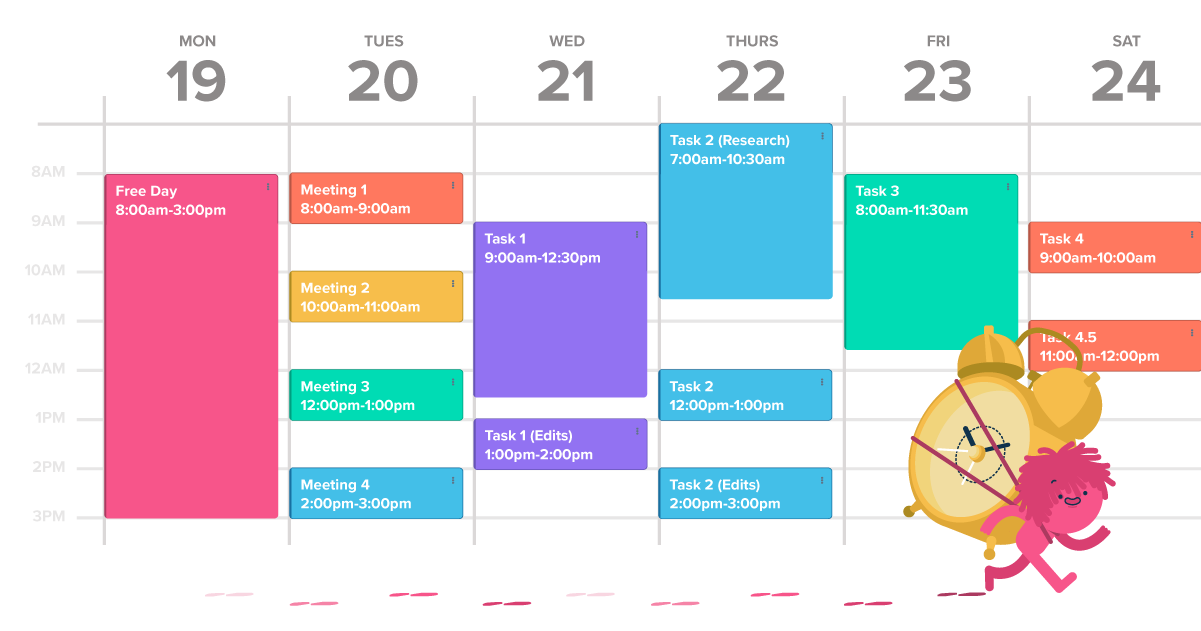When Should You Get Rid of Negative Thoughts?
We are programmed to constantly scan our environment and try to find things to fix (or fixate on) – it’s in our very human DNA. And I get it – we wouldn’t have survived as a species had we not been like that (I mean, look at the poor Dodo!). Although primitive dangers like these are far gone, the human evolutionary setup is well-versed in considering what-if and worst-case scenarios. However, when negativity becomes the driving force of your life, you may need to take action. Even so, today I’m arguing that you don’t need to completely get rid of negative thoughts.
No matter what you do, you’re bound to consider the negatives of any situation and decision – that’s just reasonable. But if your negative thoughts are inciting anxiety, making you unable to make decisions or even try something new for fear of failure, you need to find ways to cope and overcome them.
If your everyday ventures are riddled with thoughts like, ‘My life is awful’ and ‘This is going to be a disaster’, I get a feeling that you may not be enjoying your life to the fullest. It’s not unusual to have negative thoughts, but when you start to believe them, you have a problem. So, let’s solve it!
Get Rid of Negative Thoughts and Feelings with These Simple Tricks
You know the movie Gladiator? Goodness, that guy has been through some shi…take mushrooms! But he was very determined to keep going. And sure, it’s just a movie, and he was trained to be the ruthless warrior (and at the time, you really wouldn’t have wanted to be a Roman gladiator), but my point still stands. What kept him going? Well, certainly NOT thinking about how he was going to fail.
It’s not life’s circumstances that ultimately break a person – it’s their thoughts. And when thoughts become too overpowering, you can try these simple exercises to get rid of them:
- Smile. Don’t kill me, and don’t turn into a Joker. Believe it or not, a study has shown that if you force yourself to smile, you can trick your mind into a more positive state. Smiling is one of those muscular motions more related to your emotions than rational thoughts – you smile when you’re happy without thinking about it. The reverse is possible, too – because we are also socialised to recognise smiles as a sign of positive emotions. Once you smile, your body sends a message to the brain that not everything is that bad. And there you go, you’re already in a better mood.
- Practise gratitude. No matter how bad it is on a single day, you can always appreciate what you already have. Remember, life doesn’t need to be perfect to be a good life. When you get overridden by negativity, be thankful for the good things you have going for you. If you’re afraid of doing something because you mIgHt EmbArrAsS yourself, don’t be – think about how many times you’ve done something that turned out to be great!
- Vent. Venting is such an underrated way of getting rid of negative thoughts, and seriously, you should try it. It does help to air your grievances to your friends or family. You don’t need to look for a solution – just to get it off your chest.
- Exercise. By now, even the birds know it: cardiovascular exercise boosts your mood. I’ll say it louder for the people in the back: doing about 30 minutes of any cardiovascular activity regulates cortisol production, making you feel better and happier. Grab a bottle and bust a move!
- Go for a walk. Extra points if you’re listening to some uplifting jams (my current recommendation: In the Heights (movie and musical) soundtrack. Everyone needs more Lin-Manuel Miranda in their life! As you walk, focus on what you see (and hear) and let your mind wander away from negative thoughts.
- Look at some uplifting pictures. Here, take a look at this happy elephant and tell me you didn’t smile! I dare you!

Get Rid of Negative Thoughts – Meditation for a Positive Mindset
When you feel a wave of negative thoughts coming, you can use one of the world’s best creations: the art of meditation! In this insanely fast world, it’s easy to lose track of your thoughts and feelings and let your (and everyone else’s) negativity run wild.
Meditation is a form of mindfulness strategy that can help you ground yourself and listen to your thoughts by challenging them and accepting them, as well as making space for positive ones. If you start to spiral into an abyss of negativity, take a step back and meditate for a bit.
Firstly, identify your negative thoughts. Negativity usually finds its way into one of these categories:
- All-or-nothing with sweeping statements along the lines of, ‘If this fails, my life is over’. This one is easy to deconstruct: Start SERIOUSLY considering just how bad it really is. Is there a plan B (why not? Make one), and what can you do to prevent the fallout?
- Mental filtering. This is when you only see the negatives while your brain (that sneaky little …!) filters out all the positives. Now’s the time to practise gratitude and remember all the good stuff.
- Jumping to conclusions. So what if your crush liked someone’s photo on Instagram – it literally means nothing, and most people like things automatically. Better send them a message and save some time.
- Personalisation. Just because something bad happened, it does not mean it was personal in any way! Things happen, people have bad days, and life throws us curveballs. That does not imply life has decided that YOU are its least favourite!
- Strict rule-set. Sometimes we create these ridiculous rules about what we should and should not do and then feel bad if we fail at them. I’ll give you a prevalent example: You shouldn’t eat carbs after 6pm. It’s insane how many people believe this disgusting diet-culture myth. Guess what, your body needs carbs, and chances are, cutting carbs is what’s making you miserable in the first place.
Once you have pegged your thoughts down as belonging to any (and multiple) of these groups, you can start challenging them actively through thorough meditation. On the most basic level, meditation is a way of thinking, and in this case, you need to think about how and why your negative thoughts are wrong and misleading. This will help you calm down a bit and apply reason rather than emotions to your current situation. There’s something called the concept of the ‘wise mind’. Your wise mind is a combination of your rational mind and emotional mind, where things are in balance. You should strive to achieve your wise mind as much as possible.
The thing is, your mind just LOVES repeating negative thoughts, and if you repeat them too many times, they start to look like the truth. Why does your brain do this? Because it’s lazy. It’s easier to think the same thoughts, which is where true meditation comes in. When a negative thought strikes, you have to work on overturning it.
Other meditation techniques and exercises to try include:
- Relax your body. Negativity tenses you up all over. Unclench your jaw and unglue your tongue from your upper palate. Relax and shake your shoulders a bit, stretch and take a moment to feel your body. Take in several deep breaths and just listen to your surroundings. The bad feelings will abate with this.
- Focus on the positives. Imagine every positive thing in your life as a lightbulb and let its glow grow bigger until you can bathe in its warmth. Let positivity take over until any negative thought is just a black cloud in the background.
- Do some yoga. From simple stretches to power flows, yoga forces you to focus on your body, feel your muscles, and release tension.

Can You Get Rid of the Negative Thoughts of Depression?
There are negative thoughts that you can think and breathe away. However, when negativity runs deeper and is followed by other symptoms such as lethargy, difficulty getting out of bed and finding reasons to do things, loss of interest in old hobbies and passions, disturbed sleep schedule, and intrusive thoughts, chances are it’s no longer temporary negativity but depression.
Depression is a mental illness that severely affects mood, behaviour, relationships – basically your whole life. It’s related to negative thoughts, but it’s a bit of a chicken-and-egg relationship: prolonged exposure to negativity and not coping with negative thoughts can cause depression. On the other hand, depression bears more negative thoughts.
Before you start panicking, thinking that it’s an endless vicious cycle, I’ll have you know that Cognitive Behavioural Therapy has made giant strides in treating depression through rewiring the mind against negativity. This practice is tied to meditation and activity on the patient’s part as it requires some hard work.
In order to re-write your own frame of mind, you must really grab those thoughts by the horns and bend them backwards. Additionally, you must look for ways to counter negative thoughts. Identify those musings that get you down and write out counter-statements. For instance, if your Debbie-Downer thought is ‘everyone is better than me at XYZ’, you need a defiant ‘I am great at XYZ’ utterance. Next time Mrs DD shows up, you slam the door in her face with your own counter-strike.
Lastly, a good deal of CBT is learning to SEE the good stuff. Go out for a walk and really focus on the positives: a playful butterfly, a particularly pretty piece of old façade, a busker playing Bohemian Rhapsody in the city – wherever you are, beauty can be found in all places and we, humans, silly as we are, love beauty. The best part is: it really is in the eye of the beholder, so you have full agency over what’s beautiful to you – make the most of it!
Naturally, not everything can be solved with simple positive thinking: if you find yourself struggling with depression, please seek professional help. The same can be said for disorders like Obsessive Compulsive Disorder, which is characterised by intense intrusive thoughts. This particular kind of disorder needs professional treatment, Exposure Response Therapy in particular.
You Can’t Get Rid of Negative Thoughts Forever
Wait, what?! All this reading and now I tell you this?!
But yes, on the whole, you cannot (and really should not try to) get rid of all negative thoughts ever and act as if everything is always just peachy. That’s called toxic positivity and you should seriously avoid people who suffer from it.
There is no shame in having some negative thoughts, a bad day, or even a bad week. Life does that sometimes. It’s perfectly fine to lean into these emotions in a productive way. Acknowledge how you’re feeling and find the root of those emotions. Accept them and thank them too because they’re alerting you to something, i.e. the fact that you’re not happy. If you stalwartly refuse to acknowledge your negative feelings and act as if everything is fine, you’re setting yourself up for a meltdown the moment that final straw breaks the camel’s back. And I promise you; it’ll be a stupid straw like the wrong cup for your morning coffee.
Sure, it’s no good dwelling on negativity at all times, but it won’t do you harm to just feel or cry out what you need to. If you need a mental health day, by all means, take one: watch some inspirational movies, plan a trip out of town, or listen to a new podcast. But most importantly, don’t be afraid to always be yourself even if that self is feeling a bit down at times.

The Best Way to Get Rid of Negative Thoughts
To recap, negative thoughts are part and parcel of daily life. It is perfectly fine to experience them and even indulge them at times, but don’t let your negative thoughts run your life. The best way to get rid of any negativity solely depends on you, but some of my favourite suggestions are
- getting some exercise/movement,
- listening to music,
- challenging negative thoughts through Cognitive Behavioural Therapy,
- meditation, and
- venting to friends over a cup of coffee.
Smile and wave your negative thoughts good-bye with these tips and remember, summer is here, go and enjoy!
Some of the best ways to quickly get rid of negative thoughts are listening to music, going for a walk, meditating, and actively re-framing negativity by looking for positive sides.
Sometimes you have to have negative thoughts too – they are a part of life! But if they affect your daily routine, mood, and behaviour, they can lead to depression and intrusive thoughts. Don’t feel bad about feeling bad, but after a few days, try to shake yourself out of your slump.
Thoughts come and go, but the best way to deal with persistent negative thoughts is through active re-framing of the way you think and see the world. Focus on beauty and the good things you have in life, and write out counter-statements for every recurring negative thought that haunts you. However, if you believe you may be struggling with depression or another mental health disorder, please seek professional help!
How we ensure our content is accurate and trustworthy?
At StudySmarter, we have created a learning platform that serves millions of students. Meet the people who work hard to deliver fact based content as well as making sure it is verified.

Gabriel Freitas is an AI Engineer with a solid experience in software development, machine learning algorithms, and generative AI, including large language models’ (LLMs) applications. Graduated in Electrical Engineering at the University of São Paulo, he is currently pursuing an MSc in Computer Engineering at the University of Campinas, specializing in machine learning topics. Gabriel has a strong background in software engineering and has worked on projects involving computer vision, embedded AI, and LLM applications.
Get to know Gabriel




